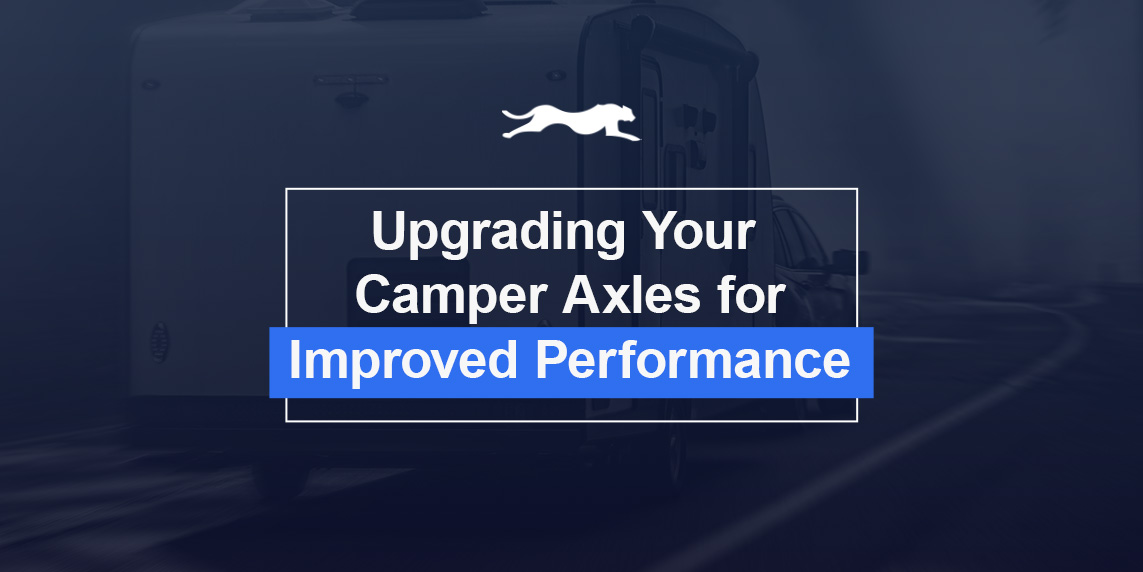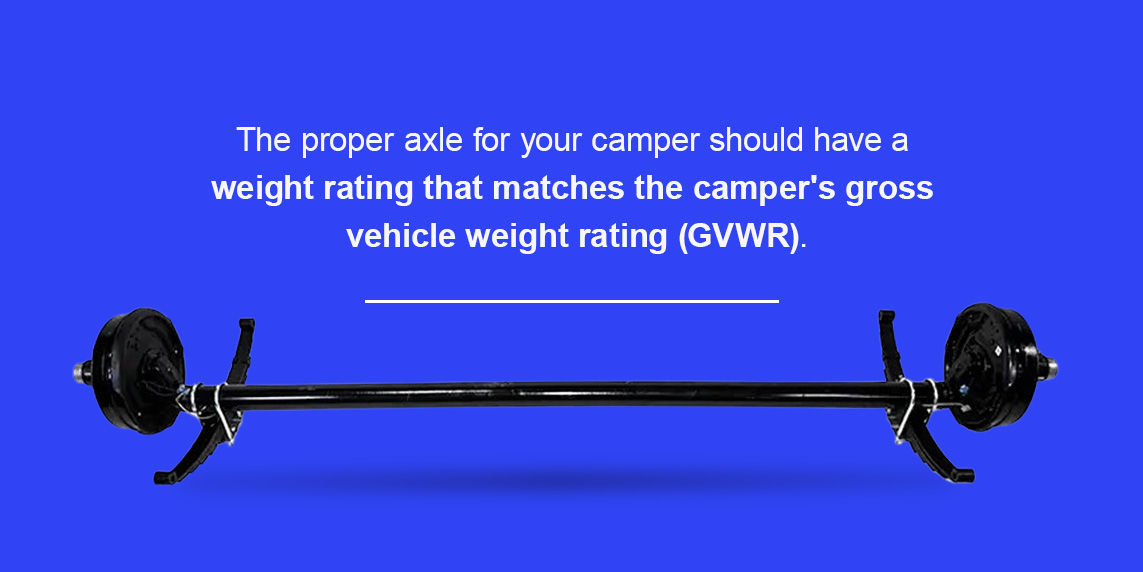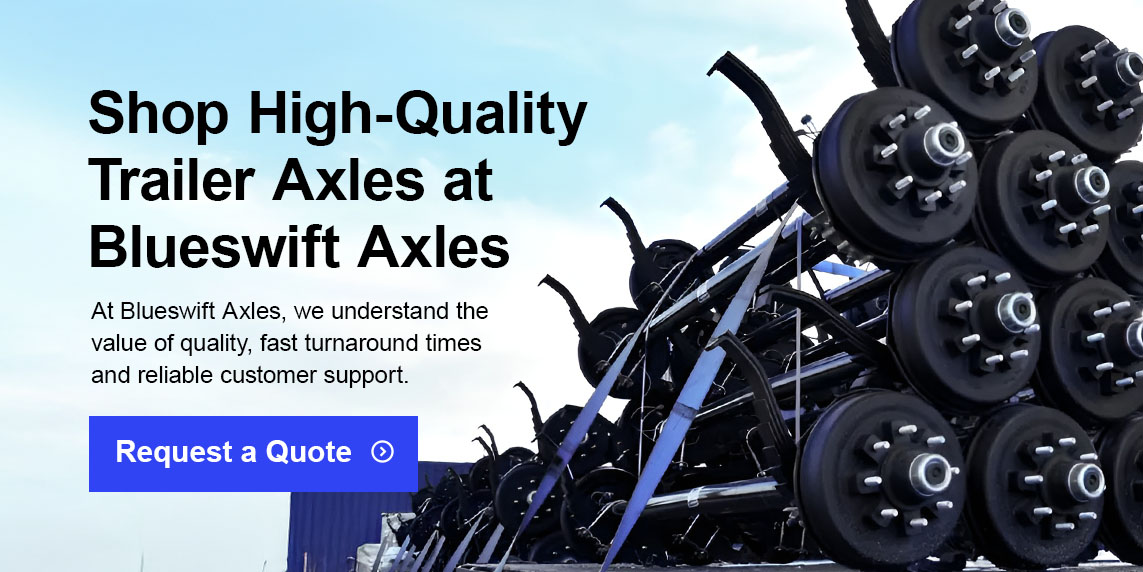A quality axle is necessary for a safe and reliable towing experience. It offers stability, a solid connection between the tow vehicle and trailer, and overall optimal performance. Using the wrong axle or a low-quality one heightens the risk of an accident, damage to the trailer and poor performance.
If you own a camper, upgrading its axle or axles contributes to stability on the road and smooth/efficient towing. Learn more about upgrading camper axles in our in-depth guide.
Benefits of Upgrading Camper Axles
Upgrading camper axles offers several benefits that can enhance your experience or positively impact your bottom line if you frequently tow for business reasons:
- Increased capacity: Trailer axles often break or bend due to overloading because they are not rated for the weight they are hauling. Upgrading the axles on your camper increases your load capacity, allowing you to tow more weight. By upgrading to a heavier axle, you increase your towing capabilities, reducing the chance of unintentional overloads.
- Improved safety: Since axles have varying weight capacities, getting the highest carrying capacity your camper can handle means you can comfortably carry loads without straining the axle and impairing stability. A stronger axle also reduces the possibility of failure, improving towing safety.
- Maximized cost savings: A camper axle upgrade means a replacement, which can be costly upfront. However, it can significantly lower maintenance costs, yielding long-term cost savings. An upgrade leads to fewer repairs and replacements. For businesses, reducing unplanned breakdowns means less downtime, which maximizes the trailer’s utility.
- Improved performance: Axles are the backbone of trailers. They are responsible for supporting the trailer’s fully loaded weight, creating stability and improving handling. With the right axle, you’ll have an easier time towing your camper. A reliable and well-built axle upgrade allows your camper to sit well on the road, improving control and comfort.
- Enhanced durability: Weight capacity and quality are critical to axle durability. Upgrading to an axle with a greater capacity means increased strength and durability because the higher the load capacity, the stronger and heavier the axle is. Axles made from high-quality materials are stronger and can withstand the rigors of towing.
Should You Upgrade Your Camper Axles?
Your current axles may be worn or no longer fully meet your needs, in which case a replacement is necessary. But should you get the same axles or upgrade? There are many reasons to consider upgrading your camper axles, such as:
- Towing heavy loads: If you’re towing heavier loads and pushing your current axles to their limits, upgrading to a higher capacity is advisable to ensure stable and safer towing.
- Other part upgrades: Keep in mind that upgrading axles for a higher carrying capacity will mean upgrading other components such as brakes, hubs, wheels and tires. If you already intend to make these upgrades, you’ll also need to upgrade your axles.
- Regular breakdowns: Your camper may experience frequent breakdowns due to damaged or worn-out axles. Upgrading to sturdier and more durable axles may lower the overall costs of camper axle maintenance.
- Comfort level: A common misconception is that opting for a heavier-duty axle leads to a rougher ride. However, upgrading to a heavy-duty axle is actually a quick way to enhance your riding experience, increase comfort and increase your braking power. Remember, a stronger suspension system improves stability and handling.
Ultimately, the choice of upgrading your camper axle depends on the trailer’s specifications and your towing needs.
How to Choose the Right Axle
Choosing the right axle for your camper can be a detailed but rewarding process. It involves steps that are crucial to your safety, the trailer’s performance and axle durability. Here are things to consider when upgrading to a better camper axle:
1. Trailer Specifications
Due to their diverse weight capacities and styles, axles are designed with different trailers in mind. Since your trailer type is a camper, assess further specifications like its weight capacity, as it impacts the type of axle you select and its load-carrying capacity. Your camper’s specifications also determine the axle configuration. This impacts variables such as spring pads and spring type on spring axles, along with bracket orientation and trailing arm angles on torsion axles.
2. Type of Axle
Axles differ as each is ideal for specific applications. Different types of axles include leaf spring, torsion, drop spindle, straight spindle and independent. Depending on your camper’s needs, you can replace one axle type with another for better performance. For example, while leaf spring axles are preferred for their durability and excellent weight distribution, you may want to upgrade to torsion axles for a smoother ride and improved handling.
3. Axle Capacity
Axle capacity is critical as it determines how much your camper can carry. The proper axle for your camper should have a weight rating that matches or is slightly above the camper’s gross vehicle weight rating (GVWR). If you want a stronger axle but aren’t sure what option would suit your camper’s needs, consult axle professionals for expert information.
4. Axle Configuration
Axles have different configurations to match a trailer’s weight and towing needs. Spring orientation could be underslung or overslung, and based on your camper’s size and load-carrying capacity, you may choose between single- and tandem-axle configurations. Single and tandem simply refer to the axle count, with tandem axles offering improved strength and stability.
5. Material Quality
Understanding the materials used in axle construction is key to ensuring quality. That means researching your provider to avoid purchasing subpar replacements that can barely last. Axles must be durable because they carry substantial weight and navigate diverse terrain. Source your camper axle upgrade from a provider with a commitment to quality.
Upgrading Axles Yourself vs. Professional Help
It would be frustrating to purchase an axle only to realize it’s not suitable for your camper. While you can replace your camper axle yourself because you already know the correct specifications, it’s best to work with a professional when considering an upgrade because that means a few changes. Buying your axle upgrade from a reputable provider exposes you to years of expertise and professional guidance to ensure you order a product that meets your needs.
Maintaining Your Axles Post-Upgrade
Axle failure can be costly, challenging to resolve and even dangerous if it occurs while on the road. Proper maintenance reduces breakdowns and promotes smooth towing, safety and longevity. Here are maintenance tips to consider after upgrading your axles:
- Keep the axle clean: Clean your axles to remove dirt and debris and lubricate moving parts to reduce friction.
- Monitor tire pressure: Tires that lack proper pressure exert stress on the axles, causing them to wear out faster. Measure your tire pressure before getting on the road.
- Clean the bearings: Axle wheel bearings are critical to smooth wheel movement. Periodically check their condition, clean them, lubricate them, and replace them if you notice signs of wear or damage.
Shop High-Quality Trailer Axles at Blueswift Axles
An axle upgrade could be the answer to exceptional performance for specialty trailers like campers. However, that means selecting a high-quality axle that matches your camper’s weight capacity and unique requirements. At Blueswift Axles, we understand the value of quality, fast turnaround times and reliable customer support.
We provide axles that exceed industry standards. Our experts work with you to understand your needs and build your axle in 48 hours to help you get back on the road. Shop our trailer axles and work with us for professional guidance!


